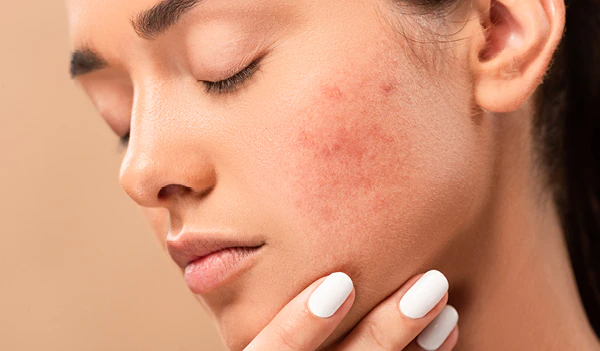
Ever wondered why you get those pesky pimples? It all starts with your pores! These tiny openings in your skin can get clogged with oil, dirt, dead skin cells, and even bacteria. This blockage leads to the development of pimples, also known as acne, blemishes, or zits. And while acne is most commonly seen in teenagers, it can affect people of all ages.
The good news is, you’re not alone! Acne is a very common skin condition. But even better, acne is treatable! In this article, we’ll explore what causes acne and how SkinCarely’s 2024 solutions can help you achieve clear, healthy skin, no matter where those breakouts decide to show up – face, neck, chest, back, shoulders, you name it!
While those pesky pimples might seem random, there are actually four main culprits behind acne breakouts:
Bacteria: Normally harmless bacteria live on your skin. However, when pores become clogged, these bacteria can multiply and trigger inflammation, leading to pimples.
Inflammation: This is the body’s reaction to clogged pores and bacteria. Inflammation makes the area around the pore red, swollen, and painful.
Excess Oil Production (Sebum): Sebum is an oily substance produced by your glands to keep your skin lubricated. During puberty, hormonal changes can cause these glands to go into overdrive, producing too much oil. This excess oil can clog pores and contribute to breakouts.
Blocked Hair Follicles: Dead skin cells and sebum can combine to form a plug that traps bacteria within the pore. This blockage creates the perfect environment for the bacteria to multiply and trigger inflammation, resulting in a pimple.
It’s important to remember that acne is incredibly common, affecting people of all ages around the world. Understanding these main causes is the first step towards managing your breakouts and achieving clear, healthy skin.
Even if you understand the main causes of acne, there can still be times when your breakouts seem to flare up for no reason. Here are some common factors that can trigger or worsen acne:
Stress: While stress doesn’t directly cause acne, it can definitely make existing acne worse. When you’re stressed, your body produces hormones that can increase oil production and inflammation, both of which contribute to breakouts.
Diet: What you eat can play a role in your skin health. Studies suggest that certain foods high in carbohydrates, such as chips, bread, pasta, and bagels, may worsen acne.
Hormonal Changes: Hormonal fluctuations can trigger acne breakouts throughout your life. Androgens, hormones that increase in both boys and girls during puberty, stimulate the sebaceous glands to produce more oil. This increase in oil can clog pores and lead to breakouts. Similarly, hormonal changes in midlife, particularly in women, can also cause acne flare-ups.
Certain Medications: Some medications, including those containing lithium, corticosteroids, or testosterone, can worsen acne as a side effect.
If you’re struggling with acne breakouts, identifying and addressing your triggers can be a key part of managing your condition. Consider talking to a Dermal Therapist about your individual situation and creating a personalized approach to achieving clear skin.
Dr Farah Rahravan is here to help you at SkinCarely!
If you live with acne, you have probably noticed acne types are not of a single type but that there is a mix.
The most common acne lesions are comedones – blackheads and whiteheads.
Other types of acne, including inflammatory lesions, which may eventually result in forming acne scarring, include:
The good news is that acne does not pose any noteworthy risk to your health. Regardless, acne, especially severe acne, can still be annoying and painful.
Chronic acne may also leave acne scars on the skin and ignoring acne and proper acne treatments can lead to or worsen emotional distress and affect self esteem. Feelings of depression or anxiety are some of the outcomes of a damaged self confidence.
But, again, keep in mind that
Acne isn’t just limited to those pesky pimples on your face! Breakouts can appear on various areas of your body, including your:
So how can you tell if you’re dealing with acne? Here are some key symptoms to watch for:
Visible Breakouts: The most obvious sign of acne is, of course, the presence of pimples themselves. These can come in a variety of forms, including whiteheads, blackheads, papules (small red bumps), pustules (red bumps with pus), nodules (larger, solid bumps), and cysts (painful, pus-filled lumps).
Skin Texture: Acne can also affect the overall texture and tone of your skin. You might experience rough, uneven patches or feel like your skin is constantly bumpy.
Sensitivity and Pain: Acne can make your skin feel tender and sore. You might experience discomfort even without directly touching the breakouts.
Discoloration: Acne breakouts can leave behind dark spots or patches (hyperpigmentation) after they heal. This is especially common for people with darker skin tones.
Acne Breakout Prevention Do’s and Don’ts
Although acne does not pose any serious health risks, it is important to treat acne because
Fortunately, there are numerous effective treatments for acne – enough treatments to give you options on how to reduce or permanently get rid of acne pimples and to avoid chances of acne scars.
Skin consultation is the first and foremost step.
Book your Skin Consultation appointment with Dr Farah Rahravan, Pharmacist and Dermal Therapist at Skincarely acne clinic in Donvale, Melbourne, VIC.
For mild acne, consider using over-the-counter products after consultation with your pharmacist.
If your acne is stubborn, make a Skin Consultation appointment with your dermal therapist at SkinCarely because even for using over-the-counter acne products work better when chosen informedly and following a Skin Consultation.
For moderate to severe acne, i.e., scarring acne or cystic acne, prescription medication might be needed.
At SkinCarely, your dermal therapist, Dr Farah Rahravan, is ALSO a pharmacist of several years. Dr Rahravan makes treatment suggestions based on your skin type, the issue you are complaining about and your overall health condition.
All treatments designed by Dr Rahravan are science-based and result from careful examination of your skin type, anatomy and dermal physiology.
Most of our skin care treatments at SkinCarely have no downtime and take roughly 30 minutes, so it is safe to say they are lunch time treatments.
You can return to work, home or to your daily routine immediately after each treatment at SkinCarely.
SkinCarely acne clinic is located in Donvale, Melbourne, VIC.
We are a short ride away from Doncaster, Doncaster East, Blackburn, Nunawading, Templestowe Lower and Balwyn North and honored to have clients from all over Melbourne, VIC.
For your skin care plans, SkinCarely is conveniently accessible in any and all of these ways:
Website
www.skincarely.com.au
Phone
04 512 21 348
Address
71 Mitcham Road, Donvale, VIC, 3111
Hesitate no more! Give us a call, visit our website, shoot us an email or directly book your acne treatment or skin consultation appointment online. At SkinCarely, YOU are in good hands!
SkinCarely skin care clinic Donvale, Melbourne is OPEN MONDAY THROUGH SATURDAY!
There are countless myths about acne – as about other conditions.
Here, we name a few:
False: Cosmetics and makeup can cause or worsen acne.
True: Cosmetics, especially noncomedogenic (nonoily) makeup that does not block pores, do not necessarily make acne worse if removed regularly.
Oil-free makeup has no influence on the effectiveness of acne medications.
False: Hygiene plays a major role in arising, bettering or worsening acne.
True: Dirty skin is not a cause of acne. As a matter of fact, harsh cleansing soaps and chemicals or hard scrubs can worsen acne by irritating your skin.
False: Greasy foods and chocolate cause or worsen acne.
True: Consuming oily food or chocolate has no to little effect on acne.
False: Only teenagers get acne.
True: People of ALL AGES can get acne, though acne is more common in teenagers.
Depending on your skin type, acne mildness or severity and your overall health condition, and after careful examination and assessment of your skin, your dermal therapist will suggest a treatment plan that fits YOU.
No cure, but very treatable! Many options exist to manage breakouts.
Treatments vary (creams, meds, light therapy). Dermatologist can recommend the best approach.
Be patient! Results take weeks with consistent use.
Mild acne: try over-the-counter cleansers, moisturizers, spot treatments. Dermatologist needed for persistent acne.

STOP AGING! Instead,
Start Looking Younger without Going under the Knife!
Follow us on :